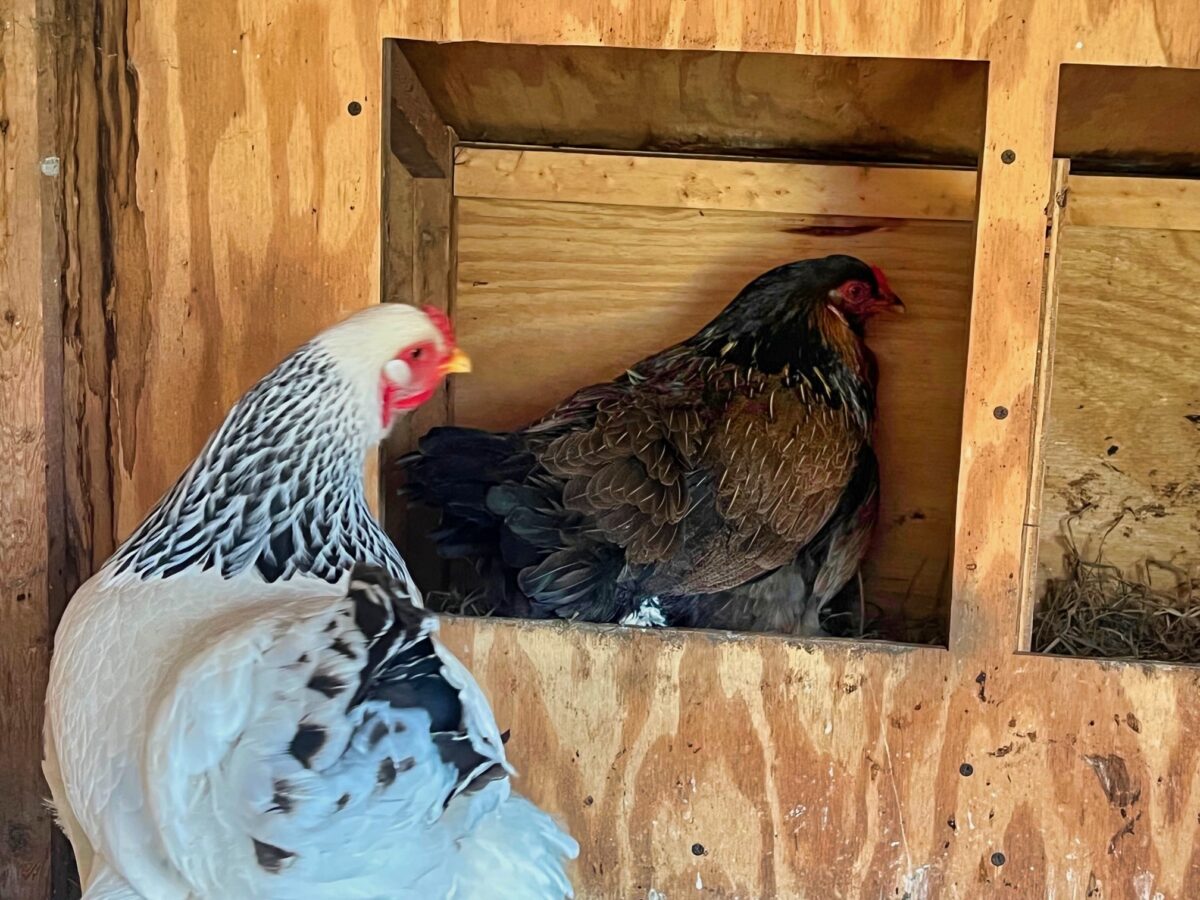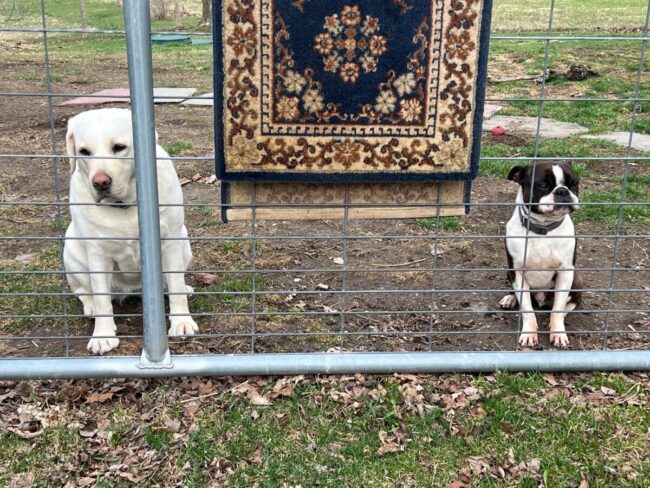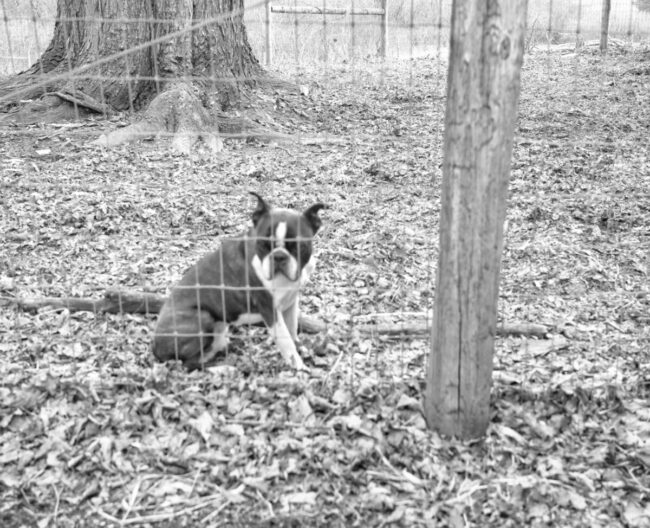Living on a farm has taught me many things about life and death and the adaptability and resourcefulness of animals. It has also reminded me repeatedly that animals might be cute, and we can project all the mush we want on them, but every animal is a killer somewhere in its DNA.
It might be bugs, birds, rabbits, chickens, worms, or plants, but every animal on the earth needs to kill things to live and survive. We got a vivid lesson in this when Bud and his crony. Zinnia slipped through an unlatched gate in their kennel area and went after our chickens.
But chases chickens, Zinnia doesn’t, but she came along for company. As we call her, Bud got hold of the red hen and got some feathers and some flesh.
(Suspects in the chicken attack, Zinnia coming along for the ride.)
When we realized what was happening, we rushed outside and got Bud back inside the gate. Two of the white hens were out in the pole barn hiding with the sheep, one was hiding in the base of a Lilac bush, and one was lying paralyzed and injured on the grass, where she had been caught.
It was wrenching to her out there, feathers on the grass, deep wounds on her backside.
I won’t soon forget the look of horror on Maria’s face. The red hen was alive, and we got her into the roost and put antibiotic ointment on her wounds. She spent the night in the nest. The older white hen wouldn’t leave her side and sat with her all night.
I think she’ll make it under Maria’s tender care.
When I went out to check, the white hen kept coming in between me and her friend, the red hen. That was pretty sweet.
Nature is beautiful, and human beings love to romanticize animals and turn them into soft and sweet versions of us.
But this is what anthropomorphizing is all about – the projection of human emotions and values onto animals, almost all of whom, from the sea to a pasture to a tree in the woods, are killing machines.
To be honest, loving nature is not simply emotionalizing or romanticizing it; to love nature is to be accepting and knowing, not merely emotionalizing.
We love Bud, he is a sweet thing, but he spends much of his time outside looking for something to kill – mice, moles, chipmunks, squirrels, chickens if he can get to them.
(Bud: Is he sorry? Forget it.)
He is a pet, but he is no better or worse than a hawk or bear or weasel or raccoon or ferret or fox or coyote. All animals, big and small, need to kill something living to live. Bud is a powerful little killing machine.
Our poor hen, who seems to be hanging on through her wounds (she is locked in the roost with the white hen, who won’t leave her), loves to kill and eat insects, plants and grass, and bugs and will eagerly peck the eyes of out of a sick or dying hen.
Bud will sit in our laps all night but couldn’t wait to get out and try to tear one of our chickens apart. He is not cruel or evil; he is just another dog, descended from a wolves
Animals either find food and die, and they don’t pause to mourn or lament their victims.
Animals, unlike people, understand and accept the nature of life. We love them no less for that, although we didn’t love Bud all that much last night.
We both felt betrayed for a few minutes: our chickens were attacked and maimed, by our own dog?
We’ve moved on; the farm is a great teacher about life. The surest way to make a dog crazy is to deny their dogness. Dogs are all hunters and killers in some way, just like the rest of the animal world.
To love a dog is to respect him or her and its nature as an animal, not a child or cuddly-poo furbaby.
Ten minutes later, Bud was curled up on the couch, waiting for a human lap to show up. Dogs are wicked smart, they manipulate us like no other animal with the positive exception of cats.
He was just being a dog.
Bud is a dog, and he was doing what dogs have done for thousands and thousands of years: look for things to eat.




I often wonder why guardian dogs like the Great Pyrenees that guard a nearby farmer’s turkeys and chickens, don’t ever decide to attack them. The centuries of breeding traits overrides the killing instinct, I guess.
I think you got it Phyllis, they bred some of the prey drive out of them…it took a long time
I was sad to read about Bud attacking the chicken, and as you said, he’s a dog being a dog. It’s just what they are. I love how pragmatic you are about this. I dislike “fur baby-izing” and the like. To me, it’s poor stewardship of an animal because anthropomorphizing makes it about the human, rather than the needs of the animal.
Very honest answer about animals and dogs in particular. Yes many breeds of dogs are killers, perhaps all in the right circumstances. Your worsts about dogs being master manipulators, also dead on..unfortunately, humans are not so smart and don’t always see it..as I tell my clients when they want to act like a dog to tell their dog what to do..” dogs are not stupid, they know you are not a dog, so quit trying to be their mother or biting them if they bite you..” Sorry about your chicken, but I am sure Bud has not given it another thought once his fun was over..
The chicken wounds…you can treat them by running warm water over the wound for 15 minutes twice a day. Apply antibiotic ointment ( no numbing agents!!) to the wounds. I had a chicken that one of my dogs went after. She healed up great. Note: chicken bruises are green. I freaked out when I saw this on my bird. It took about 2 1/2 weeks of treatment, but she recovered fully. I took her to a chicken Vet and he recommended the treatment. Best of luck!
Thanks Jane, we know, we’ve treated many a chicken over the years. Red Hen is got 0-50 odds.
Bud is a terrier, that’s what they do. I have 3 rat terriers, they regularly kill rodents lizards snakes large bugs. The mellowest one of the pack stalked and lunged at a finch in the yard the other day. It was quick and flew off unscathed.
So true and accurate is your accounting of events on your farm, Jon.
The very reason I insisted on bringing my two children (now 32 and 36 years young) up in the country with animals who were cared for, doctored, shown in 4-H, and some raised and slaughtered for their meat. Excellent lessons in all of this.
Jon, if Brown Hen was bitten by Bud, she almost certainly needs a shot of antibiotic. Bite wounds almost always infect unless there are antibiotics on board.
Just sayin’….
We have good medical vet advice, Sharon, thanks, Red Hen is getting good care and everything she needs..if you’re injured you want to be Maria’s animal..
I was curious so I looked it up. From “The smart canine” website, “In the same era as the dog-fighting Boston Terriers, [the smaller Boston Terrier] breed was once bred to hunt vermin. In fact, they specialized in taking out all types of vermin that plagued the early garment factories situated in New England of the 1800s.. . . . [I]n garment factories, [rats] would often chew up the garments. As such, the only solution at the time was to breed dogs with high prey-drive to find and kill these pesty vermin. This was another great use case for the old Boston Terrier. Like with most terriers, these dogs had a feisty nature and viciousness to them. . . . . Combined with a quick stride and good strength, and this terrier was bad news for rats.” and as you’ve all said, Bud was being Bud. Aside: I thought this was the story that belonged to the rat terrier, but, clearly “terrier-tude” is the key.